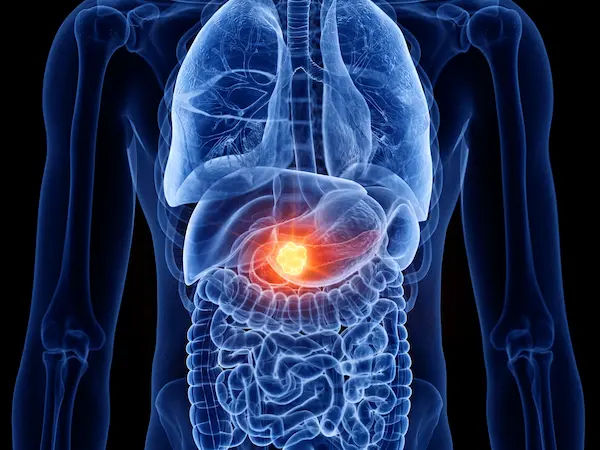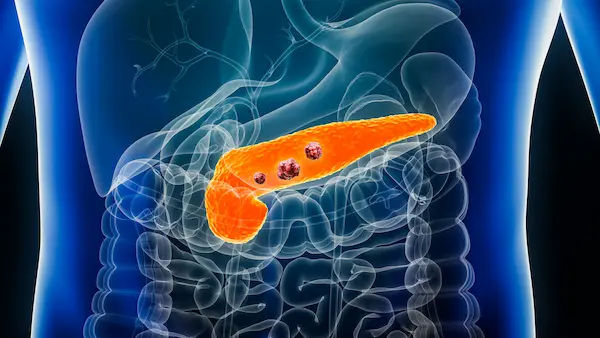What Leads To Pancreatic Cancer?
Learn about the key risk factors and causes of pancreatic cancer, including smoking, obesity, diabetes, and genetic conditions. Understand what you can do to lower your risk.

Written by Dr. Rohinipriyanka Pondugula
Reviewed by Dr. Dhankecha Mayank Dineshbhai MBBS
Last updated on 13th Jan, 2026

Introduction
Pancreatic cancer is often described as a silent disease, frequently detected at an advanced stage due to its vague initial symptoms. Understanding what leads to pancreatic cancer is a critical first step in awareness, prevention, and early intervention. While not all causes are fully understood, decades of research have pinpointed specific factors that significantly increase an individual's risk. This article delves deep into the world of pancreatic cancer, moving beyond a simple list to explore the complex interplay between genetics, lifestyle, environment, and preexisting health conditions. We'll break down the factors you can't change, like age and family history, and, more importantly, the ones you can influence, such as smoking and weight management. Our goal is to empower you with knowledge, separating evidence-based risks from common myths and guiding you on when to seek professional medical advice.
Understanding Your Pancreas and Pancreatic Cancer
The pancreas, a silent workhorse nestled deep in your abdomen, plays a dual role in keeping you healthy. It’s crucial to understand its function to grasp how things go wrong.
The Role of a Healthy Pancreas
A healthy pancreas has two primary jobs. First, its exocrine cells produce powerful enzymes that are released into the small intestine to digest fats, proteins, and carbohydrates. Second, its endocrine cells, clustered in islets, produce vital hormones like insulin and glucagon, which regulate your blood sugar levels. This intricate balance is essential for converting food into energy.
How Pancreatic Cancer Develops?
Pancreatic cancer begins when genetic mutations occur in the DNA of pancreatic cells. These mutations cause cells to grow uncontrollably and continue living after normal cells would die. This accumulating mass of cells can form a tumor. Over time, these cancerous cells can invade nearby tissues and organs or break away and spread (metastasize) to other parts of the body. The most common type, pancreatic ductal adenocarcinoma, originates in the lining of the ducts that carry digestive enzymes out of the pancreas.
Non-Modifiable Risk Factors: What You Can't Change
Certain risk factors are inherent and beyond our control. Awareness of these helps in understanding personal risk and the importance of vigilance.
Age and Demographic Factors
The risk of developing pancreatic cancer increases significantly with age. Most patients are diagnosed after the age of 65. Additionally, statistics show a slightly higher risk for men than women and for individuals of African American descent compared to other racial groups. The reasons for these demographic disparities are complex and likely involve a combination of socioeconomic factors and access to healthcare alongside biological differences.
Family History and Inherited Genetic Syndromes
About 10% of pancreatic cancer cases are considered familial. Having a first degree relative (parent, sibling, or child) with the disease doubles or even triples your risk. This points to a strong hereditary pancreatic cancer link. Certain inherited genetic syndromes carry a dramatically higher risk.
Consult Top Specialists
Key Genetic Mutations (BRCA2, PALB2, etc.)
Specific gene mutations passed through families are significant drivers of risk. These include:
- BRCA2 Gene Mutation: Well known for its link to breast and ovarian cancer, this mutation also substantially increases pancreatic cancer risk.
- PALB2 Gene: A partner to BRCA2, mutations in this gene are also linked to higher risk.
- Lynch Syndrome (HNPCC): A condition that raises the risk for many cancers, including colorectal and pancreatic.
- Familial Atypical Multiple Mole Melanoma (FAMMM) Syndrome: Characterized by moles and melanomas, this syndrome, caused by p16/CDKN2A mutations, greatly increases pancreatic risk.
Genetic counseling can be valuable for those with a strong family history.
Personal Health History (Diabetes, Chronic Pancreatitis)
A longstanding history of type 2 diabetes is a confirmed risk factor. The relationship is complex, as a recent onset of diabetes can also be an early symptom of the cancer itself. Furthermore, chronic pancreatitis, a longstanding inflammation of the pancreas, is a known risk factor, often linked to genetic mutations like hereditary pancreatitis.
Modifiable Risk Factors: What You Can Influence
This is where knowledge translates directly into power. Addressing these factors can lower your overall risk profile.
Tobacco Use: The Most Significant Avoidable Risk
Smoking is one of the most consistent and avoidable risk factors for pancreatic cancer. Smokers are about twice as likely to develop the disease compared to nonsmokers. Experts believe cancer causing chemicals in tobacco smoke are absorbed into the blood, damaging the pancreas. The good news? Quitting smoking significantly reduces risk, with it approaching that of a nonsmoker after about 1520 years.
Body Weight and Dietary Choices
Being overweight or obese, particularly in adulthood, increases the risk of pancreatic cancer. A diet high in red and processed meats, saturated fats, and sugary drinks is also associated with a higher risk. Conversely, a diet rich in fruits, vegetables, and whole grains is believed to have a protective effect. Obesity contributes to chronic inflammation, elevated insulin levels, and changes in metabolism, all of which may promote cancer development.
Chemical and Occupational Exposures
Heavy exposure to certain chemicals used in dry cleaning and metal working industries, such as chlorinated hydrocarbons and certain pesticides, has been linked to a higher incidence of pancreatic cancer in studies. While the risk to the general public is low, it underscores the importance of workplace safety protocols.
The Complex Link Between Diabetes and Pancreatic Cancer
The connection between diabetes and pancreatic cancer is a classic "chicken and egg" scenario that researchers are still untangling.
Diabetes as a Cause and a Consequence
Long Standing type 2 diabetes (over 5 years) is an established risk factor, likely due to the associated high insulin levels and chronic inflammation that can encourage tumor growth. Conversely, pancreatic cancer itself can cause new-onset diabetes by destroying insulin-producing cells. This is why a sudden diagnosis of diabetes in an individual over 50 with a healthy weight and lifestyle can sometimes be an early, subtle warning sign of an underlying tumor. If you experience such a sudden change, it is crucial to consult a doctor for a thorough evaluation.
Less Common and Associated Conditions
Other health issues can also influence risk, though the links are sometimes less direct.
Chronic Pancreatitis
As mentioned, long-term inflammation of the pancreas is a significant risk factor. This is true for both hereditary forms and those linked to heavy alcohol use over many years. The constant cycle of cell damage and repair can increase the chance of erroneous DNA mutations leading to cancer.
Bacterial Infections (H. Pylori) and Periodontal Disease
Some research suggests that infection with H. pylori (the bacteria known for causing stomach ulcers) may be linked to a slightly increased risk of pancreatic cancer. Furthermore, studies have observed an association between poor oral health, periodontal disease, and pancreatic cancer risk, though a direct cause-and-effect relationship has not been proven. The theory is that harmful bacteria from the mouth may enter the digestive system, promoting inflammation.
Myths vs. Facts: What Doesn't Cause Pancreatic Cancer
It's just as important to dispel common myths. There is no conclusive evidence that pancreatic cancer is caused by:
- Alcohol: While heavy, chronic alcohol use can lead to pancreatitis (a risk factor), moderate alcohol consumption is not a direct cause.
- Coffee: Earlier fears about coffee have been disproven; current research shows no link.
- Artificial Sweeteners: Despite past concerns, major studies have not found a consistent link to pancreatic cancer in humans.
- Stress: While chronic stress can weaken the immune system, it is not a direct cause of cancer.
Conclusion and Next Steps
Understanding what leads to pancreatic cancer empowers us to make informed choices about our health. While we cannot change our age or genetics, we can take proactive steps to mitigate modifiable risks. Quitting smoking, maintaining a healthy body weight, eating a balanced diet, and managing chronic conditions like diabetes are powerful tools for prevention. Most importantly, listen to your body. Persistent abdominal or back pain, unexplained weight loss, jaundice (yellowing of the skin and eyes), or a new diabetes diagnosis warrant a conversation with a healthcare professional. If you have multiple risk factors or concerning symptoms that persist beyond two weeks, consult a doctor online with Apollo 24|7 for further evaluation and personalized guidance. Early awareness and action are your greatest allies.
Consult Top Specialists
Consult Top Specialists

Dr. Dayanashre N
General Physician
3 Years • MBBS
Bengaluru
PRESTIGE SHANTHINIKETAN - SOCIETY CLINIC, Bengaluru

Dr. Bhethala Sharan Prakash
General Physician/ Internal Medicine Specialist
5 Years • MBBS MD
Bengaluru
PRESTIGE SHANTHINIKETAN - SOCIETY CLINIC, Bengaluru

Dr. Gautam Singal
Cardiologist
10 Years • MBBS, DNB - General Medicine, DNB - Cardiology
Delhi
Apollo Clinic East Of Kailash, Delhi

Dr. Ramalinga Reddy
General Physician
5 Years • MBBS MD General medicine
Bengaluru
PRESTIGE SHANTHINIKETAN - SOCIETY CLINIC, Bengaluru

Dr. Sumanjita Bora
Cardiologist
9 Years • MBBS, PGDCC
Bengaluru
Apollo Clinic, Sarjapur Road, Bengaluru
Consult Top Specialists

Dr. Dayanashre N
General Physician
3 Years • MBBS
Bengaluru
PRESTIGE SHANTHINIKETAN - SOCIETY CLINIC, Bengaluru

Dr. Bhethala Sharan Prakash
General Physician/ Internal Medicine Specialist
5 Years • MBBS MD
Bengaluru
PRESTIGE SHANTHINIKETAN - SOCIETY CLINIC, Bengaluru

Dr. Gautam Singal
Cardiologist
10 Years • MBBS, DNB - General Medicine, DNB - Cardiology
Delhi
Apollo Clinic East Of Kailash, Delhi

Dr. Ramalinga Reddy
General Physician
5 Years • MBBS MD General medicine
Bengaluru
PRESTIGE SHANTHINIKETAN - SOCIETY CLINIC, Bengaluru

Dr. Sumanjita Bora
Cardiologist
9 Years • MBBS, PGDCC
Bengaluru
Apollo Clinic, Sarjapur Road, Bengaluru
More articles from Pancreatic Cancer
Frequently Asked Questions
Is pancreatic cancer always hereditary?
No, only about 10% of cases are considered familial or strongly hereditary. The vast majority (90%) occur sporadically, often due to a combination of acquired genetic mutations, age, and lifestyle factors.
What are the very first signs of pancreatic cancer?
Early signs are often subtle and easily mistaken for other conditions. They can include mid back pain, unexplained weight loss, loss of appetite, new-onset diabetes, indigestion that doesn't respond to medication, and light-colored stools. Jaundice (yellow skin/eyes) is a more definitive but often later sign.
Can you prevent pancreatic cancer?
There is no guaranteed way to prevent it, but you can significantly reduce your risk by not smoking, maintaining a healthy weight, exercising regularly, and eating a diet rich in fruits, vegetables, and whole grains.
How is pancreatic cancer diagnosed if symptoms are vague?
Diagnosis typically involves a combination of imaging tests (like CT scans, MRIs, or endoscopic ultrasounds) and blood tests for tumor markers like CA 199. A biopsy is usually required for a definitive diagnosis. Apollo 24|7 offers convenient home collection for blood tests that can be part of an initial investigative panel.
Should I get genetic testing for pancreatic cancer risk?
Genetic testing is generally only recommended for individuals with a strong family history (multiple affected relatives, early onset cases) or a known family cancer syndrome. This decision should be made in consultation with a genetic counselor or a specialist doctor.
.webp)



.webp)